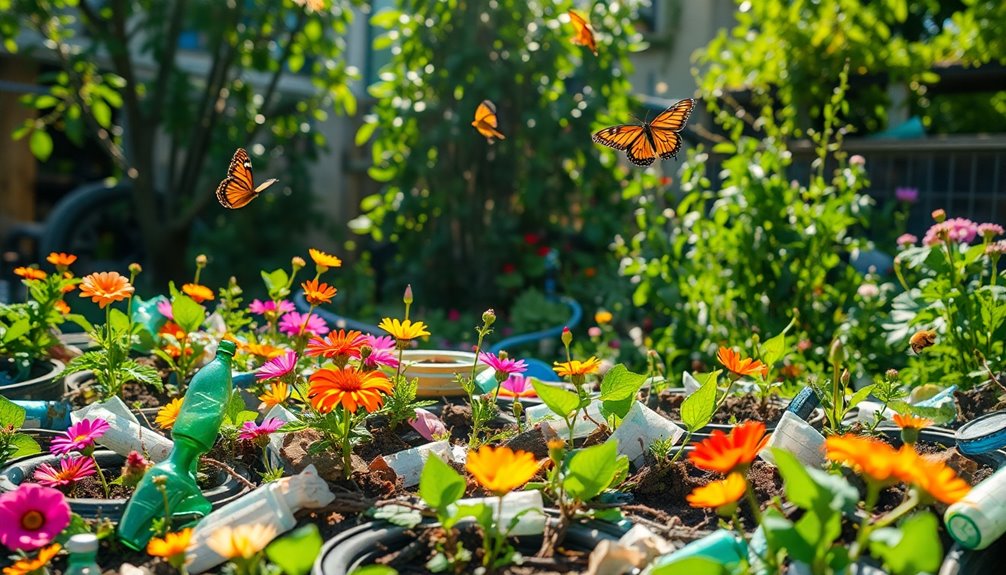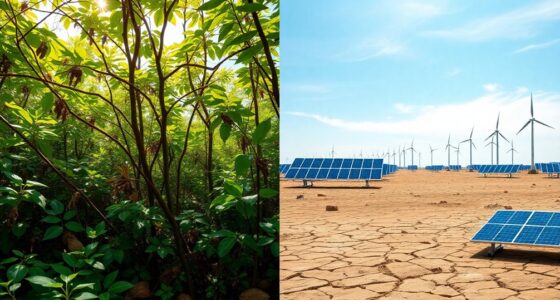Recycling plays an essential role in preserving biodiversity by conserving natural resources and reducing pollution. For instance, recycling one ton of paper saves 17 trees, which protects habitats for many species. By minimizing the need for raw material extraction, recycling helps decrease deforestation and the threats that come with it. It also lowers greenhouse gas emissions, which are crucial for maintaining healthy ecosystems. As you engage more in recycling, you contribute to a healthier planet and enhanced biodiversity. If you're interested in how your actions can make a difference, there's even more to explore on this topic.
Key Takeaways
- Recycling conserves natural resources, reducing the need for raw material extraction that threatens wildlife habitats and biodiversity.
- One ton of recycled paper saves 17 trees, directly protecting ecosystems and the species that inhabit them.
- Recycling decreases pollution from plastics and metals, minimizing disruption to ecosystems and fostering healthier environments for diverse species.
- Lowering greenhouse gas emissions through recycling helps mitigate climate change impacts, promoting resilience in ecosystems and preserving biodiversity.
- Increased recycling efforts lead to enhanced biodiversity, resulting in healthier ecosystems and improved overall environmental health.
Understanding Recycling's Role

Understanding recycling's role in preserving biodiversity is essential, especially since it directly impacts our planet's health. When you recycle, you conserve natural resources, which reduces the need for raw material extraction. This process helps protect habitats and biodiversity; for example, recycling one ton of paper saves 17 trees.
By diverting recyclable materials from landfills, you minimize habitat destruction and pollution risks, safeguarding local ecosystems. Additionally, recycling decreases greenhouse gas emissions that contribute to climate change, ultimately threatening species survival.
Environmental Benefits of Recycling

While you might think of recycling as just a way to manage waste, it actually offers significant environmental benefits that extend far beyond simple trash reduction. It helps conserve resources, protects habitats, and supports biodiversity. By recycling, you reduce greenhouse gas emissions, mitigating climate change impacts that threaten diverse species.
Here's a quick look at some key recycling benefits:
| Material | Resources Saved | Environmental Impact |
|---|---|---|
| Paper | 17 trees, 7,000 gallons of water | Reduces landfill waste |
| Aluminum | 95% energy savings | Lowers greenhouse gas emissions |
| Glass | 30% less energy | Decreases pollution from manufacturing |
| Plastic | 88% energy savings | Helps maintain healthy ecosystems |
| Electronics | Rare metals recovery | Preserves biodiversity |
Embracing recycling promotes a sustainable future for all living beings. Additionally, natural remedies for environmental health can be supported through widespread recycling efforts.
Economic Impact of Recycling

Recycling isn't just good for the environment; it creates real job opportunities and boosts local economies.
With over 1.1 million people employed in the U.S. recycling industry, you can see how it contributes to revenue generation.
Job Creation Opportunities
The recycling industry plays an essential role in job creation, employing over 1.1 million people across various sectors in the U.S. By supporting the recycling movement, you're not just helping the environment; you're also contributing to significant job creation opportunities.
This sector generates around $200 billion annually, providing sustainable economic benefits that strengthen local economies. For every job in waste management, recycling creates 1.17 additional jobs, illustrating its potential to enhance community engagement.
As the industry grows, it fosters new markets for recycled materials, driving innovation and expanding job prospects in manufacturing. Ultimately, increasing recycling efforts leads to reduced waste disposal costs and the creation of green jobs, supporting a more sustainable economic model for everyone. Additionally, the growth in recycling initiatives can also mitigate costs associated with total overhead variance, further enhancing economic stability within communities.
Revenue Generation Potential
As communities invest in recycling initiatives, they reveal significant revenue generation potential that can benefit local economies.
The recycling industry in the U.S. generates around $200 billion annually, making it an essential economic driver. By enhancing recycling infrastructure, you can create over 1.1 million jobs, directly fueling economic growth.
Additionally, the rising demand for recyclable materials means higher prices, boosting revenue for recycling programs. This not only helps municipalities save on waste management costs but also allows them to reinvest in community services.
For every job in recycling, an estimated 1.17 additional jobs emerge in the broader economy, illustrating how interconnected and impactful recycling is for local economies.
Embrace recycling to turn waste into wealth!
Community Engagement in Recycling
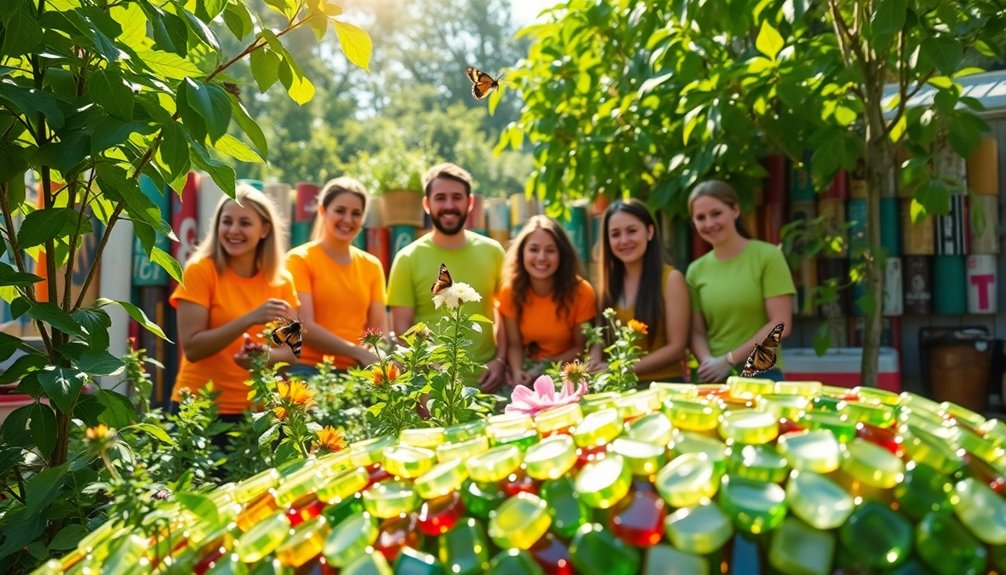
Engaging with local recycling programs can make a real difference in your community.
By partnering with schools and organizations, you can help educate others about proper recycling practices and the importance of sustainability.
Together, your efforts can foster a culture of environmental stewardship that benefits everyone.
Local Recycling Programs
When communities come together to support local recycling programs, they create a powerful impact on sustainability and biodiversity.
By participating in recycling programs, you commit to environmental responsibility and help reduce the need for new materials. Accessible curbside pickup and drop-off locations make it easy for you to recycle items like plastics, batteries, and electronics.
Initiatives, such as the glass recycling event during Earth Month, foster community awareness and demonstrate the tangible benefits of your efforts. The Oxford Recycling Center offers guidance, ensuring you know what materials can be recycled effectively. Additionally, community recycling programs can stimulate economic growth through job creation and increased market competitiveness.
Community Partnerships and Education
Local recycling programs lay the groundwork for broader community engagement, fostering partnerships that amplify sustainability efforts. By collaborating with local governments, businesses, and citizens, you can enhance participation in recycling initiatives. Educational programs in schools and community groups promote environmental stewardship, encouraging hands-on projects that emphasize waste reduction. Additionally, intelligent tutoring systems can be utilized to educate the community on recycling practices, improving overall awareness and participation.
Here's how community partnerships can make an impact:
| Partnership Type | Activity | Impact |
|---|---|---|
| Schools | Workshops on recycling | Increased awareness |
| Local Businesses | Sponsoring clean-up events | Strengthened neighborhood ties |
| Community Groups | DIY upcycling events | Innovative waste solutions |
Engaging in these initiatives fosters sustainable practices that benefit the ecosystem, showcasing the importance of recycling in preserving biodiversity.
Challenges in Recycling Practices

Despite the growing awareness of recycling's importance, several challenges undermine its effectiveness. Contamination of recyclables, like food residue in plastic containers, can lead to entire batches being sent to landfills, worsening environmental issues and threatening biodiversity.
Inconsistent recycling regulations across regions create confusion that discourages public participation, limiting the ability to reduce waste. Limited access to recycling facilities, especially in rural areas, restricts community involvement and hampers efforts to divert materials from landfills, impacting local ecosystems.
Additionally, economic fluctuations can affect demand for recycled materials, leading to reduced funding for recycling programs. A lack of public awareness and education on proper recycling practices results in lower participation rates, further exacerbating waste issues and threatening natural habitats. Implementing effective relaxation techniques can help individuals manage stress related to environmental concerns and encourage more proactive recycling behaviors.
Innovations in Waste Management

As new technologies emerge, innovations in waste management are transforming how we approach recycling and sustainability. Advanced sorting technologies, like AI-driven systems, enhance efficiency by accurately separating materials for reuse, minimizing contamination.
The shift towards biodegradable materials and sustainable packaging aims to reduce waste generation and lessen environmental impact, supporting a circular economy. Blockchain technology boosts transparency in recycling supply chains, ensuring better management of materials.
Moreover, upcycling techniques create new products from waste, such as furniture from reclaimed wood and fashion items from old textiles, promoting creativity and resource conservation.
Innovations in waste-to-energy technologies, like anaerobic digestion, convert organic waste into renewable energy, alleviating landfill pressure while cutting greenhouse gas emissions.
Recycling and Biodiversity Preservation
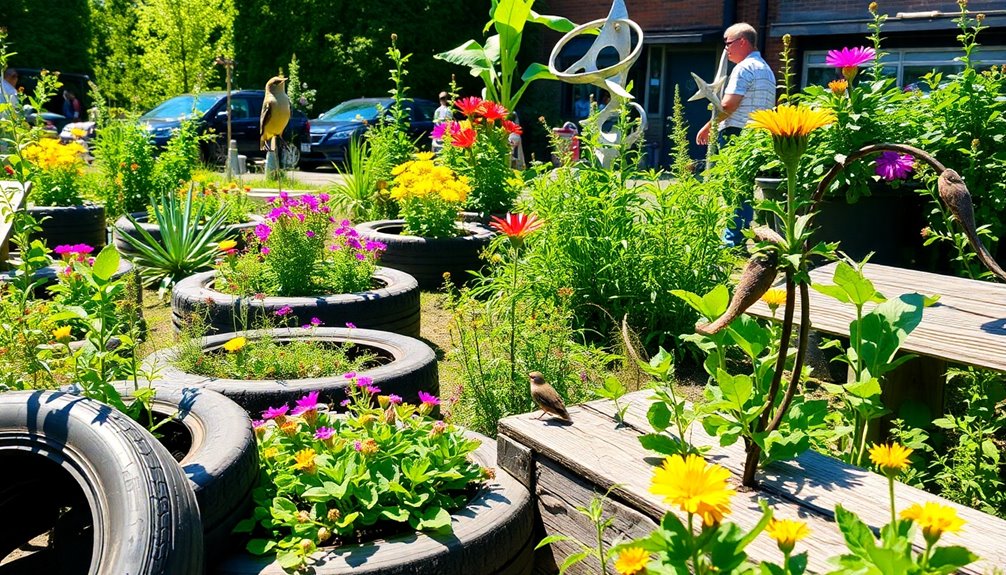
Recycling plays an essential role in preserving biodiversity, as it greatly reduces the demand for raw materials that often leads to habitat destruction.
By recycling, you help protect ecosystems and maintain species diversity. Here's how recycling contributes to biodiversity preservation:
- Saves Trees: Recycling one ton of paper saves 17 trees, protecting essential habitats for countless species.
- Reduces Pollution: By recycling plastics and metals, you decrease pollution, minimizing ecosystem disruption important for a healthy environment.
- Conserves Natural Resources: Recycling conserves natural resources, reducing deforestation and mining, both major threats to biodiversity.
Moreover, recycling initiatives lower greenhouse gas emissions, mitigating climate change impacts on ecosystems.
Your efforts in recycling can notably enhance biodiversity and promote a healthier planet.
Future of Recycling Initiatives

The impact of recycling on biodiversity sets a strong foundation for future initiatives aimed at enhancing sustainability.
As you consider the needs of future generations, you'll see that environmentally responsible practices are essential. Innovations like automated sorting systems can improve efficiency, reducing energy consumption and contamination rates.
Extended Producer Responsibility (EPR) programs push manufacturers to design sustainable products, minimizing resource extraction.
Community-based recycling programs empower you and your neighbors to take ownership of local efforts, fostering a collaborative spirit.
Partnerships between businesses and municipalities are paving the way for circular economy models, which aim to minimize waste and enhance resource recovery.
Call to Action for Sustainability
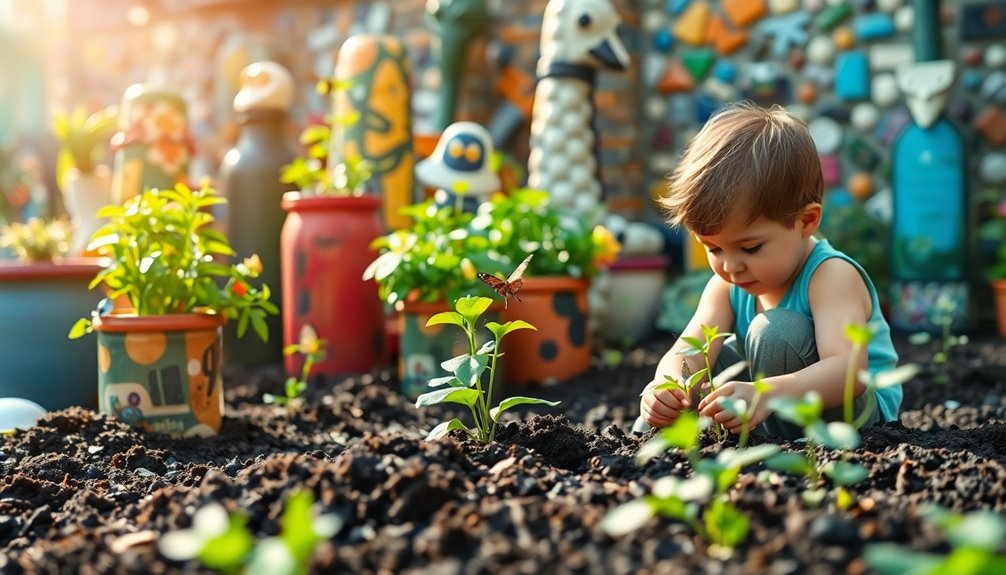
While many people may not realize it, every small action you take towards sustainability can have a considerable impact on our planet's health.
By embracing recycling, you help conserve natural habitats and protect biodiversity. Here's how you can make a difference:
- Recycle paper: Saving 17 trees per ton can considerably enhance wildlife habitats.
- Reduce plastic waste: By recycling plastics, you prevent pollution that threatens aquatic ecosystems.
- Support local initiatives: Get involved in community recycling programs that promote environmental stewardship.
Additionally, engaging in sustainable practices can significantly contribute to the protection of cultural and historical symbols that embody strength and resilience within communities.
Your commitment to recycling and sustainability not only reduces the demand for raw materials, but it also strengthens our ecosystems, making them more resilient against climate change.
Take action today for a healthier planet!
Frequently Asked Questions
How Does Recycling Impact Biodiversity?
Recycling impacts biodiversity by reducing the demand for raw materials, which helps protect natural habitats.
When you recycle, you save resources like trees and metals, preserving ecosystems that countless species depend on.
It also cuts down pollution and energy use, lowering greenhouse gas emissions that threaten wildlife.
How Does Trash Affect Biodiversity?
Trash affects biodiversity in numerous harmful ways. When you throw away plastic, it often ends up in oceans, harming marine life and their habitats.
You mightn't realize that landfills can leach toxic chemicals, contaminating soil and water, which disrupts local wildlife.
Trash also attracts invasive species that compete with native ones, leading to declines in their populations.
What Are the Environmental Impacts of Waste Recycling?
Imagine your favorite park, vibrant with life. When you recycle, you're like a gardener, nurturing that park by reducing waste.
Recycling cuts down the need for raw materials, which means fewer trees are chopped and habitats destroyed. It also slashes pollution, keeping air and water cleaner for wildlife.
In 2013 alone, recycling prevented 186 million metric tons of carbon dioxide from entering the atmosphere. So, every bottle you recycle helps protect our planet's beauty.
How Is Biodiversity Affected by Landfills?
Landfills considerably affect biodiversity by destroying natural habitats and displacing native species.
When waste occupies land, it degrades ecosystems and allows invasive species to thrive, outcompeting local flora and fauna.
Additionally, methane emissions from decomposing waste alter climate conditions, further threatening biodiversity.
Contaminants can leach into soil and water, harming nearby plant and animal life.
Ultimately, the expansion of landfills leads to deforestation, resulting in the loss of critical habitats essential for diverse ecosystems.
Conclusion
Just like a caterpillar transforms into a butterfly, your recycling efforts can turn trash into treasures for our planet. Each bottle you save, each paper you recycle, nurtures the delicate ecosystems around us, allowing them to flourish. By embracing recycling, you're not just decluttering your home; you're weaving a vibrant tapestry of life that supports biodiversity. So, let's all be gardeners of our Earth, planting seeds of sustainability for future generations to thrive in a flourishing, healthy world.
